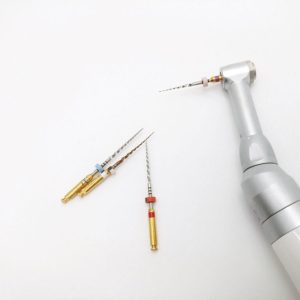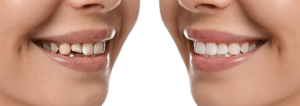A smile is one of the first things people notice about others. A bright, healthy smile conveys confidence, vitality, and warmth, while a dull or yellowed smile can give the impression of being unhealthy or unkempt. For many people, maintaining a beautiful smile is an important part of their overall appearance and self-confidence.
Thankfully, there are many ways to improve the look of your teeth, including whitening, bonding, and veneers. However, one of the most popular options for achieving a perfect smile is dental crowns.
What Are Dental Crowns?

Teeth aesthetics has a wide variety of solutions nowadays. Crowns, veneers, implants, bonding, and whitening are some of them. Dental crowns are caps that are placed over existing teeth in order to improve their appearance.
Crowns can be made from a variety of materials, including porcelain, ceramic, and resin. They are color-matched to the surrounding teeth and can be used to correct a wide range of aesthetic concerns, such as misshapen or chipped teeth, gaps between teeth, and stained or discolored teeth.
In addition to improving the look of your smile, dental crowns also offer some functional benefits. They can be used to strengthen weak or damaged teeth, protect root canal-treated teeth, and support dental bridges.
When Would You Need a Dental Crown?
Dental crowns can be used to treat a wide range of dental problems.
-
In general, crowns are used when a tooth is too damaged to be repaired with a filling but not so damaged that it needs to be extracted. -
Crowns can also be used to support a dental bridge. -
They are used to cover a discolored or misshapen tooth. -
Crowns are sometimes used as part of a root canal treatment.
The decision to place a crown on a tooth is always made on a case-by-case basis, and your dentist will take into account the extent of the damage to the tooth, as well as your overall oral health. Sometimes instead of a crown, you may need a simple cosmetic dental bonding. If you have a tooth that requires treatment, your dentist will discuss all of your options with you and help you to make the best decision for your individual needs.
Types of Dental Crowns
The purpose of a dental crown is to restore the function and appearance of a damaged or misshapen tooth. There are many different types of dental crowns, each with its own advantages and disadvantages. Crowns are typically made from porcelain, ceramic, or metal, and they can be personalized to match the color of your natural teeth. Here are some types of dental crowns.
Porcelain
Porcelain crowns are a popular choice for dental patients who want to restore their smile. These tooth-colored crowns are made of porcelain, a strong but brittle material. Porcelain crowns are less flexible than other types of crowns, making them more likely to break if they receive a hard blow.
However, porcelain is very resistant to staining and can be color-matched to your natural teeth. Porcelain crowns are also very natural-looking, making them a good choice for patients who are concerned about their appearance. Porcelain crowns can be a great option for patients who want to restore their smile.
Gold Crowns
While gold crowns are often the most durable option, they are also the most expensive. However, all crowns require proper care to ensure that they last. How long do dental crowns last? Brushing and flossing regularly is essential, as is avoiding hard foods and sticky candy. With proper care, any type of crown can provide years of trouble-free use.
Stainless Steel
Stainless steel crowns are often used for children’s teeth. Stainless steel crowns are less expensive than other types of crowns and can be easily removed when the child’s permanent teeth come in.
In addition, they are less likely to cause allergic reactions than other types of crowns. However, stainless steel crowns can discolor the surrounding teeth and may need to be replaced more often than other types of crowns.
Metal Crowns
Metal dental crowns are a type of dental restoration that is used to cover a tooth that is damaged or decayed. Metal crowns are very strong and durable, and they can last for many years with proper care. However, they can be visible if the tooth is near the front of the mouth. In addition, metal crowns may cause allergic reactions in some people.

Resin Crowns
Dental crowns can be made from a variety of materials, including resin. Resin crowns are the least expensive option, but they are not as strong or durable as metal or porcelain crowns. As a result, they are more likely to break or chip over time. Ultimately, the best type of dental crown for you will depend on your individual needs and budget.
Temporary Crowns
Temporary crowns are usually made of a softer material, such as acrylic, and are used while a permanent crown is being made. Permanent crowns can be made of ceramic, porcelain, metal, or a combination of these materials. They are more durable than temporary crowns and are intended to be a long-term solution. Regardless of the type of crown, the goal is always to create a natural-looking tooth that blends in with the rest of the smile.
Zirconia Dental Crowns
Zirconia crowns are made from strong and durable ceramic, making them an ideal choice for molars and other back teeth. They are also less likely to chip or break than other types of ceramic crowns. In addition, zirconia crowns can be customized to match the color of your natural teeth. As a result, they offer a more aesthetic solution.
Porcelain And Metal Hybrids
Porcelain crowns offer a natural look and color matching. Metal crowns offer strength and persistence. Thus the combination of these two should rise into something really amazing. Porcelain-metal hybrids combine the strength of metal with the natural-looking appearance of porcelain, but they can be more expensive than other types of crowns.
What Are the Costs of Crowns?
When it comes to dental crowns, there are a few key factors that can affect the cost. Types of dental crowns and cost are correlated. Make a search for “dental crowns near me” to find the nearest dental center. On the other hand, consider the material used. Porcelain or ceramic crowns are typically the most expensive option, but they also offer the most natural look. Metal crowns are usually the least expensive, but they can be less durable and may not match the color of your natural teeth as well. Another factor to consider is which teeth are being crowned. Front teeth dental crowns usually require more work and are thus more expensive than back teeth.
What Materials Are Used in Dental Crowns?

Crowns can be made from a variety of materials. The most common type of crown is the ceramic crown. Ceramic crowns are strong and durable, and they can be matched to the color of your natural teeth. However, they are also more brittle than other types of crowns and can chip or break if you bite down on something hard. Porcelain-fused-to-metal crowns are another popular option. They are made from a metal core that is covered with porcelain. Metal crowns are made from gold, palladium, or stainless steel.
What to Expect from the Dental Crown Procedure?
Dental crown procedures that condition dental crowns before and after results:
-
The dentist will numb your tooth and surrounding gums so you don’t feel any pain during the procedure. -
Once your tooth is numb, the dentist will use a drill to remove any decay in the tooth and create space for the new crown. -
If you have had root canal treatment, this step may not be necessary. -
An impression (mold) will then be made of your teeth so the new crown can be created in a dental lab. -
In some cases, a temporary crown may be placed over your prepared tooth until your permanent crown is ready. -
Once your permanent crown is ready, you will return to the dentist’s office to have it checked for fit and cemented into place.
It is normal to experience some mild sensitivity to hot and cold temperatures immediately after getting a dental crown, but this will subside within a few weeks as you get used to your newly crowned tooth.
The Different Dental Crowns and Dental Implants
Both are designed to improve the appearance of your smile and protect your teeth from further damage. Different types of dental crowns are dental implants. However, there are some key differences between these two procedures. Let’s see dental implants vs crowns key points. Dental crowns are typically made from porcelain or ceramic, and they are placed over the existing tooth. This helps to restore the tooth’s original shape and size.
Dental implants, on the other hand, are actually artificial replacement teeth that are surgically implanted into the jawbone. This provides a more permanent solution for those who have lost one or more teeth.
Veneers are another option for teeth appearance improvement. Veneers cost from $1.600 to $2.500 per tooth. Compare crown vs veneer cost to make a final decision. Also, veneers are not so much a protection for the teeth but an aesthetic solution.
Benefits Of Dental Crowns
Dental crowns offer many benefits for patients who have damaged or misshapen teeth.
-
Restore the appearance of the smile. -
Strengthen and protect damaged teeth. -
Improve chewing function. -
Prevent future dental problems. -
Support dental bridges, making them an important part of restorative dentistry.
Overall, dental crowns offer many benefits for patients with damaged or misshapen teeth. By restoring the function and appearance of the smile, crowns can help patients enjoy a better quality of life.
Conclusion
If you want to obtain a perfect bite and are in need of a dental crown, you have several types and materials from which to choose. The procedure overview and costs associated with each type vary as well. Talk to your dentist about the best option for you.
FAQ
Most frequent questions and answers
One way to get a cheap dental crown is to go to a dental school. Dental students are required to do a certain number of hours of clinical work, and many of them offer low-cost services. You may also consider cheaper materials.
The process of getting a crown generally takes more than one visit to the dentist. During the first visit, the dentist will take an impression of your teeth in order to create a mold that will be used to create the crown. You will then need to return for a second appointment so that the crown can be fitted and cemented into place.
There are a few alternatives to crowns. Veneers are placed on the surface of the teeth and covered with a tooth-colored restoration. Another alternative is an implant which is rather a replacement of teeth than a way to strengthen them.
It depends on the insurance. Not every dental insurance covers crowns. Some insurance companies do cover dental crowns, and others don’t. If your insurance company doesn’t cover dental crowns cost, you can usually opt for a payment plan with the dentist’s office.
It usually takes minimum two appointments to have a dental crown placed. The first appointment is to take impressions of your teeth and to make the mold for the crown. The second appointment is to place the finished crown.




